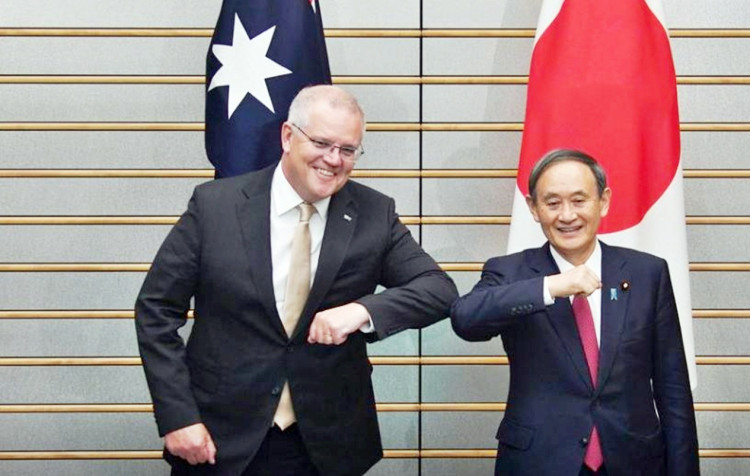China's Communist Party newspaper the Global Times on Wednesday criticized the Reciprocal Access Agreement signed between Japan and Australia as clearly targeting China and said it "further accelerates the confrontational atmosphere in the Asia-Pacific region - and negatively."
The newspaper said the agreement wasn't about defense cooperation - because Japan and Australia were "geographically distant from each other."
"This affects each country's understanding of the regional situation," Global Times said in an editorial.
The newspaper also accuses the administration of President Donald Trump of masterminding the landmark anti-China treaty.
Japan and Australia, intend "to mold their own political and security certainties - forming their own bilateral alliance within a bigger framework with the U.S.," said Chen Hong, director of the Australian Studies Center at East China Normal University in Shanghai, in the Global Times.
"It is not an exaggeration to say that the Japan-lead Quad is budding into an 'Indo-Pacific NATO,'" according to Chen.
"What's worse, it provides a new lever for the U.S. to divide Asia. Since modern times, it is Japan that has invaded China and Southeast Asia - not that other way round. China did not expand its military to Australia, either."
China experts claim the agreement will harm regional stability because Japan and Australia will later entice other Asia-Pacific countries to join their military alliance. They claim this "Asian NATO" will support America's Indo-Pacific strategy and Japan's strategic containment of China.
Once signed and ratified the agreement will be Japan's first pact since it signed the Treaty of Mutual Cooperation and Security with the U.S. in 1960. This treaty allows the U.S. to station warships, warplanes and troops in and around Japan.
Australian Prime Minister Scott Morrison and Japan Prime Minister Yoshihide Suga agreed in principle Tuesday in Tokyo to approve the agreement that will be a framework for the two countries' troops to conduct joint operations and training. The agreement will allow each to use the others' military bases and pave the way for more military exercises - including in the South China Sea.
"We reached agreement in principle on a reciprocal access agreement which had been negotiated to elevate security and defense cooperation between Japan and Australia to a new level," Suga said.
Neither Morrison nor Suga identified China as the target of the agreement. Morrison did, however, say China has nothing to fear from the agreement.
"This is a significant evolution of this relationship, but there is no reason for that to cause any concern elsewhere in the region," Morrison said. "I think it adds to the stability of the region, which is a good thing."






